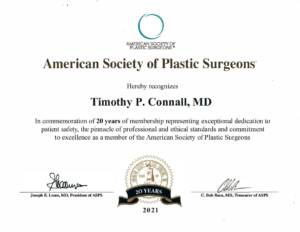
This Article Has Been Medically Approved By Dr. Timothy Connall
 Identifying the Problem
Identifying the Problem
Oversized breasts, also known as macromastia, can lead to several unwanted complications. Some of the most common issues include chronic back and neck pain, rashes, irritation of the skin, and difficulty finding comfortable clothing or bras that don’t dig into the shoulders due to the weight of the breasts. And some women may not have these specific issues, but simply feel awkward or self-conscious about their proportions.
Researching Insurance Coverage
A breast reduction procedure, also known as a mammaplasty, can provide relief from all of these symptoms, and may be covered by your healthcare insurance if it is symptomatic macromastia. Therefore, if you are considering a breast reduction and you believe your surgery could be covered by insurance, you should first start by contacting your insurance provider and request their policy requirements, in writing, for qualifying for a medically needed breast reduction.
Insurance coverage varies greatly and may require the patient to first receive physical therapy, an orthopedic consult, and/or other possible treatments depending on the patient’s symptoms. Some insurance plans will request an assessment from a surgeon that includes a formula using the patient’s body surface area and weight of the breast tissue that is removed to determine if the surgery is simply cosmetic versus a medical necessity.
Do All Plastic Surgeons Accept Healthcare Insurance For Breast Reduction Surgery?
If you decide that you want to begin the process to get a breast reduction, and you are hoping to have it covered by insurance, you should start by asking your plastic surgeon’s office if they will accept your healthcare insurance upon scheduling your consultation appointment. Some plastic surgeons accept healthcare insurance whereas other plastic surgeons do not work with insurance companies, especially when the far majority of the surgeries they perform are elective procedures.
Oftentimes, patients will decide on going with a surgeon they believe will give them the best results, regardless of insurance. Patients may decide they want to pay out-of-pocket for their procedure and/or submit a claim to their insurance companies following their surgery if that is an option with their insurance policy.
Next Step – The Consultation. What Questions Should I Ask My Plastic Surgeon During A Breast Reduction Consult?
When you decide to get a breast reduction, you may not just want relief from your symptoms and may also need to work with your plastic surgeon to make a few important decisions. One of the most important decisions of all is how small you wish to go.
What is the Minimum Size for Breast Reduction?
There are a number of factors that will determine how small you should go in your breast reduction. These factors include the composition of your breasts, the total amount of breast volume you have, the type of incision that is used, and more. Your surgeon should discuss your personal wants and needs and also walk you through each of these factors to help you determine the potential options for the final size of your breasts.
How Small Do Most Women Go?
This can vary greatly, but averages show that most women who get a breast reduction will go down one or two cup sizes. Again, this can vary from patient to patient, and it is always best to discuss specific size goals with your surgeon.
How Small is Too Small?
Your nipple needs to sit on a sufficient amount of breast tissue because this is how it gets its blood supply. In other words, if you remove too much breast tissue, your nipple will not get the blood flow that it needs. This can lead to a number of complications, and in some instances, may even lead to loss of the nipple. For a breast reduction, you can usually go as small as you want, just so long as you leave enough breast tissue to support the nipple.
How Much Breast Tissue Do You Need to Support the Nipple?
Most surgeons will caution you against going down more than three full cup sizes (for example, from a DDD to a C). Reducing your breasts by more than three full cup sizes may be endangering the nipple’s blood supply.
What if I Want to Go Down More Than Three Cup Sizes?
If you really want or need to go down more than three full cups, that may be possible, though your surgeon may suggest simply removing the nipple and then grafting it back into place. This can be the best way of ensuring that the nipple continues to get the kind of blood supply it needs.
Why Should I Spend Time On The Plastic Surgeon’s Website Before My Consultation Appointment?
Always start by looking at a plastic surgeon’s website. A lot of the questions you should be asking can and will be answered on their website. You should review their information and look at their photo galleries before going to your consultation, to make more valuable use of your time spent with the surgeon. Then you can ask the questions not already answered for you.
What Questions Should I Ask?
When seeing a plastic surgeon for any procedure, questions you should get answered should include the following: How do I best prepare for this surgery? What is the recovery time? Is your surgeon a board-certified plastic surgeon? How many successful surgeries have they done? How much experience do they have with your particular surgery? Studies have shown time and again, the best surgeons are those that have the most experience and have done the most of any given surgery.
Find Out More About Breast Reduction Surgery
Ultimately, deciding to get a breast reduction is a very personal decision. While there are some basic guidelines and rules of thumb that patients should know about, you will want to talk with an experienced plastic surgeon to discuss your personal needs and goals.
If you have questions about breast reduction surgery, reach out to Esprit® Cosmetic Surgeons in Portland, Oregon. We would be happy to schedule a consult for you with Dr. Timothy Connall. At Esprit, we do not work with insurance companies, but many patients still decide on having their surgery with Dr. Connall because of his high level of expertise and experience. Or if you prefer to consult with other plastic surgeons in the Portland area that do take insurance, still feel free to call our office and we can provide you with Dr. Connall’s personal recommendations.





